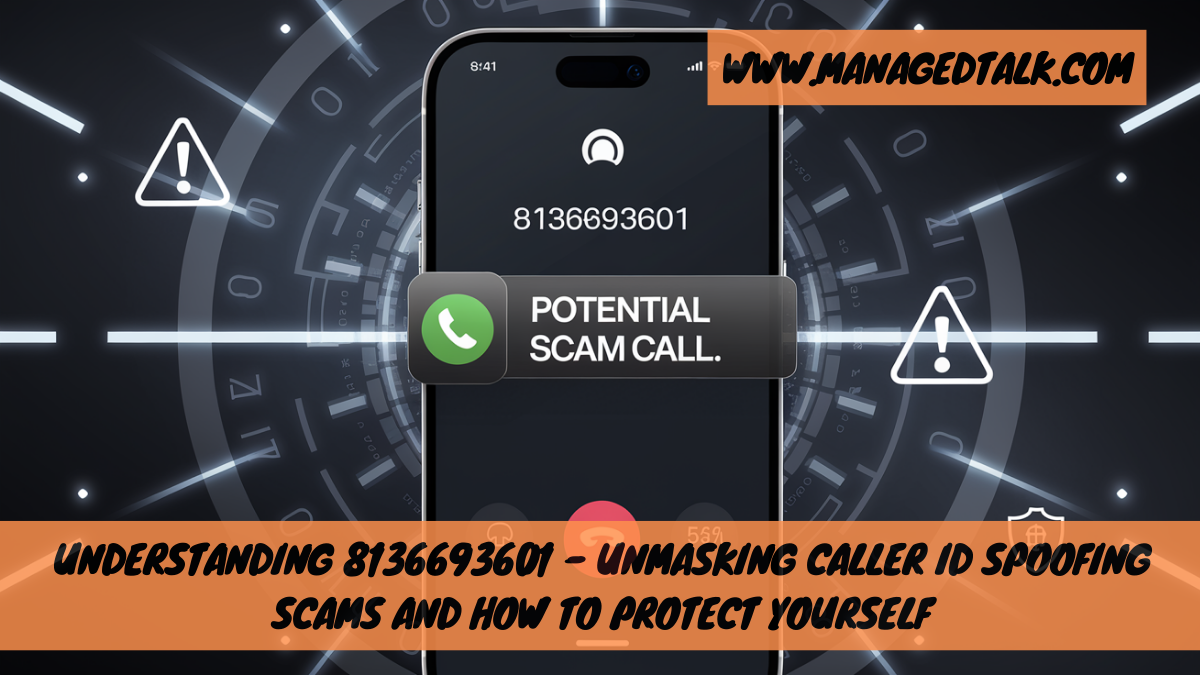Introduction
If you’ve recently received a call from “8136693601,” you might wonder if it’s legitimate or just another scam. As technology advances, so do the techniques used by scammers. Caller ID spoofing is one such method, allowing fraudsters to hide their real identities by making calls appear as though they’re coming from a familiar or local number.
The number “8136693601” is commonly associated with caller ID spoofing scams. Learn how scammers use it to appear legitimate and ways to protect yourself from phone fraud.
This article will dive into the details of caller ID spoofing, specifically with the number “8136693601,” uncover the motivations behind these calls, and equip you with tips to protect yourself.
1. What is Caller ID Spoofing?
Caller ID spoofing is a tactic used to disguise the real identity of a caller. It allows scammers to manipulate the information that appears on your phone screen, making it look like a local or familiar number, like “8136693601.” This technology has given scammers the power to trick people into answering their calls by appearing more trustworthy.
2. How Scammers Use the Number “8136693601”
Scammers often choose numbers like “8136693601” because they seem local or recognizable. These numbers are selected based on algorithms that identify which numbers are more likely to be answered. This tactic increases the likelihood that you’ll pick up the call.
The number “8136693601” has been flagged by various users and call-blocking services as part of a network of spam numbers. It’s essential to be cautious when you receive a call from this number, as it might not be who it claims to be.
3. The Purpose and Tactics Behind Spoofed Calls
The objectives of spoofed calls can vary, including:
- Phishing Scams: Pretending to be a financial institution or service provider.
- Emergency Fraud: Claiming an emergency involving a family member.
- Fake Offers: Offering non-existent prizes, vacations, or rewards.
These calls are usually made with urgent language, pressing you to make quick decisions or share personal information. Caller ID spoofing with numbers like “8136693601” is particularly insidious because it exploits the trust people place in familiar area codes.
4. How Caller ID Spoofing Affects You
Receiving spoofed calls can lead to financial loss, identity theft, and emotional distress. By giving away personal or financial information under the belief that you’re talking to a legitimate entity, you might unknowingly allow scammers access to your accounts.
5. Identifying a Spoofed Call
When you receive a call from a number like “8136693601,” consider the following tips to determine if it’s legitimate:
- Unusual Requests: Be wary if the caller asks for sensitive information.
- Urgency and Pressure: Scammers often create a false sense of urgency.
- No Official Details: Legitimate organizations will have verifiable contact methods and won’t ask for private information over an unsolicited call.
6. What to Do When You Receive a Call from “8136693601”
If you receive a suspicious call, take these steps:
- Hang Up Immediately: Disconnect without engaging.
- Verify the Caller: Call back using the official contact number, not the number shown on caller ID.
- Report the Number: File a report with the FCC or FTC, as they monitor and track spam calls.
- Use a Call-Blocking App: These apps filter calls from known spam numbers like “8136693601.”
7. Legal Framework and Authorities’ Efforts to Combat Spoofing
The Federal Communications Commission (FCC) has taken steps to curb caller ID spoofing. The TRACED Act aims to strengthen measures against robocalls and scam calls by requiring phone providers to authenticate calls through the STIR/SHAKEN protocol.
8. Protecting Yourself from Caller ID Spoofing
Consider the following strategies to prevent falling victim to caller ID spoofing:
- Educate Yourself: Recognize common tactics used by scammers.
- Enable Call Blocking: Use tools that automatically block spam numbers.
- Avoid Answering Unknown Calls: If you don’t recognize the number, let it go to voicemail.
- Set Up Alerts: Some phone providers allow users to flag suspicious calls in real-time.
- Limit Personal Information Sharing: Be mindful about the information you share publicly.
9. FAQs about Caller ID Spoofing and the Number “8136693601”
Q1: What is the number “8136693601”?
A: “8136693601” is a number frequently used in caller ID spoofing scams to appear familiar or local to the recipient.
Q2: Why do scammers use local-looking numbers like “8136693601”?
A: Local numbers increase the chances of call recipients answering, as they may assume the call is from a neighbor or a local business.
Q3: How can I avoid falling victim to spoofed calls?
A: Use a call-blocking app, verify calls before sharing information, and avoid picking up unknown calls.
Q4: What should I do if I suspect I’ve been scammed by a caller using “8136693601”?
A: Report the incident to the FCC, FTC, or your phone provider. Update any compromised accounts and stay alert for further fraudulent activity.
Q5: Are authorities doing anything to stop caller ID spoofing?
A: Yes, the FCC has implemented measures like the TRACED Act and STIR/SHAKEN protocols to combat caller ID spoofing, though it remains challenging to fully eradicate the issue.
